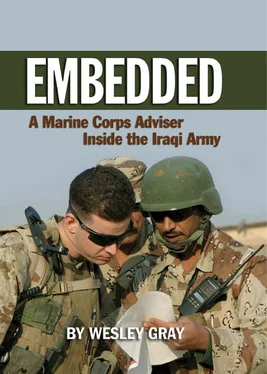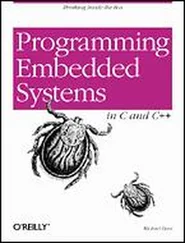Le Gette and I immediately knew what had happened. Captain Hasen, a decent guy most of the time, had tried to pull a fast one on us. Hasen had a functional pressure washer; however, what he really wanted was a fleet of pressure washers. His method to attain this was to tell the MiTT his old pressure washer was broken. He assumed he could simply sit back and wait until we bought him a new one. That might have worked in the past, but this time we actually followed up on his claim. Le Gette and I had learned our lesson: Iraqis will milk a sugar daddy as long as you let them.
“Gray,” Le Gette said, “I’m going to tell Adams that the jundi don’t need a pressure washer.” I replied, “Roger, dude, I’m going to go see what Qatan is up to. Major Gaines, Staff Sergeant Haislip, and I are supposed to meet him. He’s taking us fishing.”
I rolled over to Qatan’s swahut to meet Gaines and Haislip. Qatan answered. “You guys ready to go fishing?” he asked. I translated for Gaines and Haislip. Gaines responded, “Na’am [Yes], Let’s catch some fish.” I looked at Gaines and said, “Sir, I have no clue what we are about to get ourselves into.” He smirked and replied, “Well, I guess we’ll find out.” Qatan grabbed his fishing nets and the remainder of his gear and signaled for us to follow him to where the eastern edge of Camp Ali snuggled up next to the Euphrates River.
We approached the wire fencing that surrounded the boundary of Camp Ali. A man-sized path had been cut through it. Haislip looked at Gaines and me. “Isn’t that the wire that is supposed to deter insurgents from sneaking on Camp Ali and killing us in our sleep?” he asked. Before I could respond, Qatan, who had already walked through the hole in the fence, hollered, “Come on, you guys are slow!”
We passed through the cleared section of the protective wire and moved to the shores of the Euphrates. Ten feet off the shore was a blanket of thick reeds, six to seven feet above the water’s edge. We quickly realized Qatan’s concept of fishing was different from our own. We thought fishing involved fishing poles, hooks, and worms. We were not thinking like Iraqi fishermen; they use nets.
I asked Qatan, “How are you going to get past the reeds?” Qatan replied, “You see that long board that leads to the reeds? Crawl along that board to the reed line. There you will see a flat piece of tin from a swahut roof. Stand on that—it’s our boat.” I looked at Qatan. “Our boat?” I asked. “It’s a piece of tin resting on some crushed reeds.” Qatan said, “Yes, Jamal, exactly.” He hopped on the five-inch-wide board, ran across it, and effortlessly moved to the reeds, where he stationed himself on the makeshift boat he had positioned in the reed line. I looked at Major Gaines. “Shit Sir, that looks pretty easy.” I followed. But my adventure to the reeds was not as graceful as Qatan’s; I ended up swimming. After doggy paddling my way to the reed line, I crawled my way onto the flat piece of tin.
Haislip, being the only sane one of the bunch, decided to stay on shore and take pictures of the scene. Once Gaines, Qatan, and I were stationed on the boat, Qatan threw his net into the river. We had a stunning view of the Euphrates. I felt like Huckleberry Finn. This was the ultimate adventure (see photo 11).
When we returned to the MiTT camp, Doc quickly scolded us. “You guys were in the Euphrates?” he said. “You know that thing is crawling with E. coli and parasites, right?” We had no response. Doc was right—as usual. Then the boss followed up with his concerns. “You guys could have been taken prisoner by the insurgents,” he said. Unlike Doc, the boss was undeniably wrong. It would take a brass-balled insurgent to try to swim up the Euphrates and somehow take us prisoner. Plus, seven months without a little fun would lead to insanity. All business and no play is a recipe for a mental breakdown.
Later that evening I stopped by the Iraqi S-1 (administration section) shop in the Iraqi COC. My stop at the S-1 earned me some wasta, an extremely important concept in Iraqi culture. Wasta is a mysterious combination of your pull, connections, subject-matter knowledge, and charisma, all of which allows you to get favors and respect from others.
After meeting with the various Iraqis working in the S-1, they pointed me to their copier and asked if I could fix it. Captain Chin, the Marine previously in my position, was unable to get them a new one or fix this old one. Thankfully, in a lifetime before the Marines, I had worked with computers and office equipment for a living.
I confidently opened the case of the copier and was greeted with copious amounts of dust and debris. I am no rocket scientist, but a layer of superfine sand dust is not good for a copier. Sure enough, after cleaning the machine, it worked like new. The Iraqis were amazed. I was a hero. I had saved them hours of having to handwrite copies of everything.
Fixing their copier was not a long-term solution, however. I had given the man a fish, but I had not taught him how to catch them. I gathered the group of S-1 personnel around me and explained the importance of weekly and daily maintenance on electronics and office equipment. I explained that maintenance would extend the life of their equipment anywhere from three to five years. They all nodded in agreement and asked me the most effective way to clean the copier, what places needed the most attention, and how to open the various panels. Sadly, I knew they were simply asking me what I wanted to be asked. Captain Chin had warned me of this. If his experiences held true, the copier would be broken again in a matter of weeks and the jundi would be begging me to buy them a new one.
Chapter 8
Simple Things Made Difficult
August–September 2006
When the Iraqi battalion received its annual dump of new supplies from the Iraqi brigade, I decided to act as interpreter and help Lt. Rob Adams, who usually dealt with supply issues but was having a tough time communicating with the Iraqis. “As salamu aleikum,” I said to the crowd of Iraqis preparing to offload the supplies. I was greeted as though I were an Arab rock star. “Jamal, Jamal, you speak Arabic? You are a good man. Come on over, sit down, we want to talk to you.” How do these guys know me? I wondered. I mustered together some Arabic words and all of a sudden I was Lawrence of Arabia with the jundi .
Amazingly, the Ministry of Defense had sent supplies for three hundred soldiers, more than enough to cover our needs at the battalion. Of course the supply count was based on necessary items such as camouflage blouses, camouflage pants, and boots. To say the MOD had actually sent full supplies for each of the three hundred soldiers would not be true. For example, we had fourteen sweatshirts, forty pairs of tennis shoes, and sixty-five pairs of gloves. Don’t ask me how those numbers worked out.
Captain Hasen explained why he was disappointed the MOD did not take all of the odd lot supplies. “Jamal, let me explain to you something about Iraqis. If you give one guy something and don’t give another guy the same thing, the bitching and complaining will be so persistent, you will wish that we all had nothing. Trust me, you will see.”
Adams suggested a great idea to Hasen. “Why don’t you use the extra items as rewards? The Iraqi officers can give these to soldiers who do exceptional things in the battalion.” Hasen quickly responded, teaching us another lesson in survivor culture. “Listen, if I give one soldier an award, all of the soldiers will immediately berate me for playing favorites and giving special treatment to a single soldier. Plus, the soldier who receives the award will be scolded for being an ass kisser. In the end, it ends up being a worse deal for both me and the soldier receiving the award. This is crazy, but true.” Adams and I nodded in agreement. In our short time interacting with Iraqis, we knew Hasen was correct. Sadly, what Americans deem to be great ideas seldom work within the Iraqi culture.
Читать дальше












